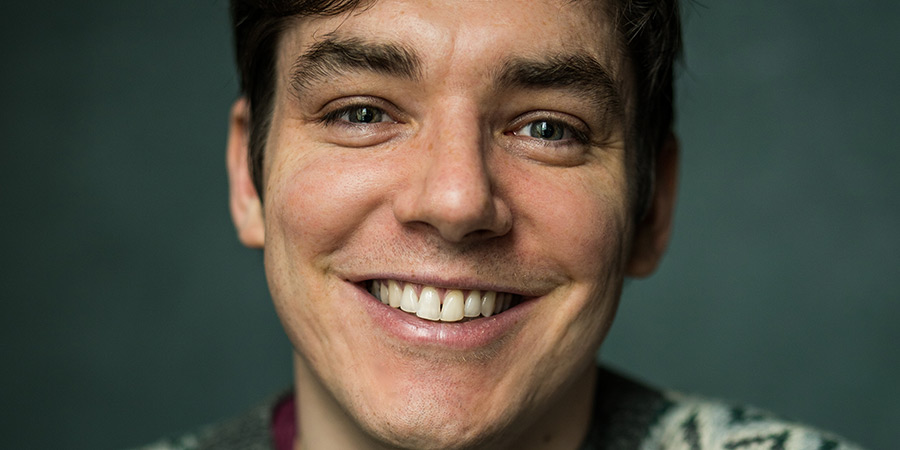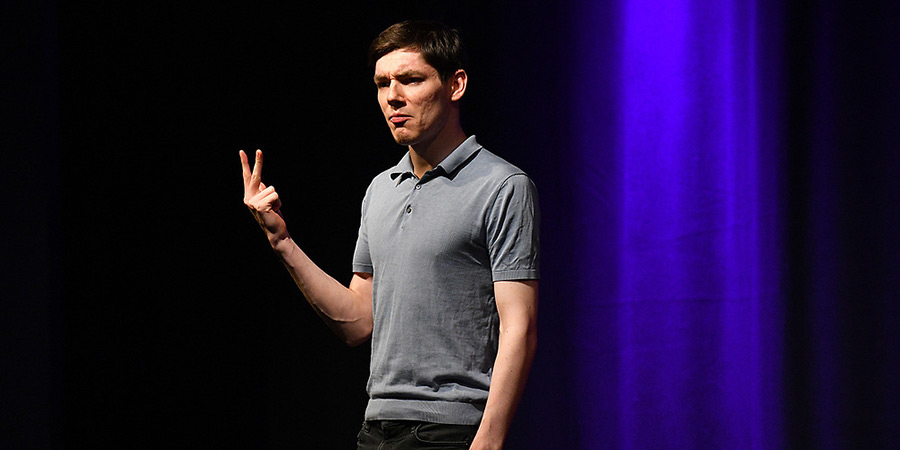My Comedy Career: Adrian Gray

We've been subscribed to Adrian Gray's online video feeds for over half a decade now. In recent years he's attracted millions of views for video he posts, particularly for his Forgotten History format. Below, we find out more about how he got to this point, and hear his thoughts on the precarious nature of internet publishing algorithms.
Tell us what you do in your job.
I consider myself a comedy writer, but that involves a few different things. I make videos for YouTube and social media, write for TV shows, produce content for brands that want to be funny online, and do little writing jobs for production companies. I also tutor children for their A Levels and GCSEs.
If there's a misconception I'd say it's the assumption that shows use writers' rooms. They don't seem to exist! If I'm writing on a TV show I'm almost always at home on my own, and might not even interact with any other writers on the show.
How did you first get involved in the comedy industry?
I started writing blogs when I was 17 that I posted on Facebook to an average of literally 1 like (thanks mum). Then at university I did stand-up, and through doing stand-up competitions I got my first agent.
What key skills do you need to be able to do your job well?
Some joke writing skills, video editing skills and audio editing skills.
What has been your biggest career achievement to date?
I'm proud of having achieved hundreds of millions of views on YouTube and TikTok. I don't really know how proud I should be because it's all based on what the algorithms decide to show people. So I guess maybe I'm more proud of the reaction than the sheer views: seeing people commenting that they've enjoyed it is a nice feeling.
I've learned that you shouldn't reject a platform because you don't think it's for you. I initially had no interest in TikTok and thought my stuff wouldn't appeal to its users, but my friend said I should give it a go and now it's one of my biggest platforms.
And what has been the biggest challenge/disappointment?
I guess I'm disappointed that I've never had anything properly commissioned. I've had plenty of things that have been 'in development', but they've never worked out.
As my online stuff has done better and better, this has mattered less and less to me. I love the internet. It's amazing to live in a time where I can make basically anything I want with no one telling me to change it, put it online, have millions of people see it, and make some money. In some ways it's an artist's dream and I'm very grateful for it.
Talk us through a typical day.
I do two hours of writing social media jokes for companies between 10 and 12. Then I have lunch and do a bit of exercise. Then I do some writing of my own videos until late afternoon/evening where I often have an hour of tutoring to do. Then in the evening I'll either continue my video writing or do something social.
Work/life balance is tricky for me, but I think booking in social things long in advance makes it harder to avoid them.
Tell us a trick/secret/resource that you use to make your job quicker/easier.
Having deadlines is really useful, but it can be hard if you're just making your own stuff and aren't really accountable to anyone. I'd suggest maybe announcing to your audience that there will be a new video out on a certain day, which then almost forces you to produce one to avoid disappointing people.
How are you paid?
For my videos, YouTube pays me monthly. This is based on how many views I've got that month, among other metrics I don't understand, but I'd say is on average about £700. I recently monetised my TikTok and that looks like it's going to pay me about £150 a month. I make about £100 a month from Patreon and Ko-Fi donations.
This kind of stuff feels a bit precarious, because it seems like it would only take a minor tweak to the algorithms for it all to collapse! Thankfully that hasn't fully happened yet.
For TV stuff I'm usually paid per episode, which is on average about £500, minus my agent's cut. They pay me through my agent.

If you could change one thing about the comedy industry, what would it be?
I wish things were just a bit clearer. When you first start talking to production companies it's not necessarily clear what they want from you, what they will base decisions on, when they will make those decisions etc. They often just ghost you as well. I wish there was a roadmap laid out in front of writers and comedians for these things that explains exactly what's needed and when.
What tips would you give for anyone looking to work in your area of the industry?
With online content, definitely post videos as shorts/reels/TikToks as these are where the views are - at least for now. That doesn't mean you shouldn't make long form content as well but it's a great way to get followers.
Also, make something that breaks the mould. People are more likely to react to something on the internet that's surprising than they are something that looks like every other comedy sketch they've seen. You're better off being weird than normal online.
This article is provided for free as part of BCG Pro.
Subscribe now for exclusive features, insight, learning materials, opportunities and other tools for the British comedy industry.



